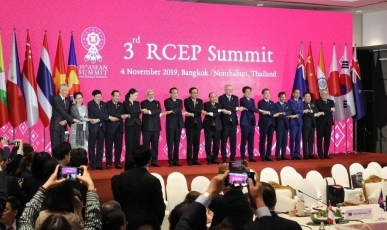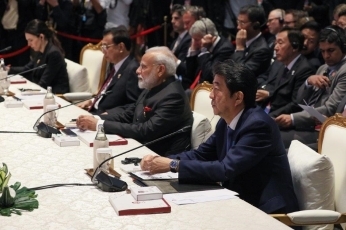Free Trade Agreement (FTA) and Economic Partnership Agreement (EPA)
3rd RCEP Summit
November 4, 2019
 Photograph of the Prime Minister attending a photograph session at the RCEP Summit
Photograph of the Prime Minister attending a photograph session at the RCEP Summit (Photo: Cabinet Public Relations Office)
 Photograph of the RCEP Summit
Photograph of the RCEP Summit (Photo: Cabinet Public Relations Office)
On November 4, Mr. Shinzo Abe, Prime Minister of Japan, visiting the Kingdom of Thailand to attend ASEAN-related Summit Meetings, participated in the Regional Comprehensive Economic Partnership (RCEP) Summit, attended by the 16 countries participating in the RCEP negotiations. The overview of the Summit is as follows.
- At the outset, H.E. Mr. Prayut Chan-o-cha, Prime Minister of Thailand, serving as the Chair, welcomed participants to the 3rd RCEP Summit.
- (1) In his statement, Prime Minister Abe expressed his gratitude for the initiatives of Prime Minister Prayut as the Chair.
- (2) Furthermore, Prime Minister Abe stated that Japan, as a promoter of free trade, has expanded free and fair rules throughout the world. The Prime Minister recalled that the Leaders’ Declaration of the G20 Summit, held in Osaka this year, enshrined that the leaders will strive to realize “a free, fair, non-discriminatory, transparent, predictable and stable trade and investment environment.” Prime Minister Abe noted that RCEP, with the 16 countries combined, accounts for half of the world’s population and 30% of the global GDP, making it the world’s largest economic area, and therefore, is extremely significant strategically and economically. In addition, Prime Minister Abe said he was pleased that, as a result of approximately 7 years of resolute efforts to establish a free and fair trading system, fixed rules will be established in areas such as e-commerce and intellectual property in the Indo-Pacific region undergoing rapid digitalization.
- (3) Prime Minister Abe stated that Japan will aim to conclude the negotiations by the 16 counrties as early as possible, including market access, and to complete the world’s largest free and fair economic area that looks ahead to the future. Prime Minister Abe also expressed his confidence that this will contribute to the achievement of a “Free and Open Indo-Pacific” advocated by Japan. Prime Minister Abe stated that Japan supports the adoption of the Joint Leaders’ Statement, and expressed Japan’s determination to work with Viet Nam, which will assume the chairmanship next year, in order to continue to play a leading role for the signing of an RCEP agreement we can be proud of in 2020.
- Statements such as the following were made by the other attendees.
- RCEP will become an important source of trade, economic growth, and innovation. The negotiators shall be instructed to swiftly address the remaining issues to ensure signature of the agreement.
- As of last year’s Summit, only 7 chapters had been compiled. Now we are close to the finish line.
- If RCEP can be finalized, it will give strong momentum to the regional economy. While the differences in views must be resolved, we are optimistic. The 16 countries should make efforts.
- We will strive to resolve the unresolved remaining issues that India is concerned about.
- While working closely with India, we need to deliver market access outcomes in order to enable India to join RCEP. This means the 16 countries will be the beneficiaries.
- After the meeting, the Joint Leaders’ Statement (English (PDF)
 / Japanese (PDF)
/ Japanese (PDF) ) was issued.
) was issued.
[Reference]
Countries participating in the RCEP negotiations: the 10 ASEAN countries (Brunei, Cambodia, Indonesia, Lao PDR, Malaysia, Myanmar, Philippines, Singapore, Thailand, Viet Nam)
Australia, China, India, Japan, the Republic of Korea, and New Zealand

